According to a survey carried out by Aspect Software, brands leveraging an omnichannel strategy achieve 91% higher year-over-year customer retention rates compared to businesses that don’t.
This astonishing figure highlights the profound impact of omnichannel marketing on customer loyalty, and it’s just the tip of the iceberg when considering the benefits of omnichannel marketing.
But what sets it apart from its close relative, multichannel marketing, and why should you, as a business owner or marketer, care?
As market leaders in customer communications management, imail comms has not only remained current with the most relevant and innovative marketing strategies in the domain of communications, but we have been trendsetters and pioneers of novel and enhanced resources for elevating the standards of the talk.
So, allow us to explain the intricacies of omnichannel vs multichannel marketing in this comprehensive yet enjoyable to go-through guide.
Importance of Knowing the Difference
Understanding the key difference between omnichannel and multichannel marketing, and depicting what omnichannel marketing offers compared to a multichannel retail model could significantly enhance your marketing strategy. While both terms involve employing various platforms for customer engagement, they diverge in execution and customer experience.
The distinct contrast lies in how these strategies integrate (or don’t) the customer’s journey across different channels. This subtle yet pivotal distinction can mean the difference between a one-time transaction and a lifetime of customer loyalty.
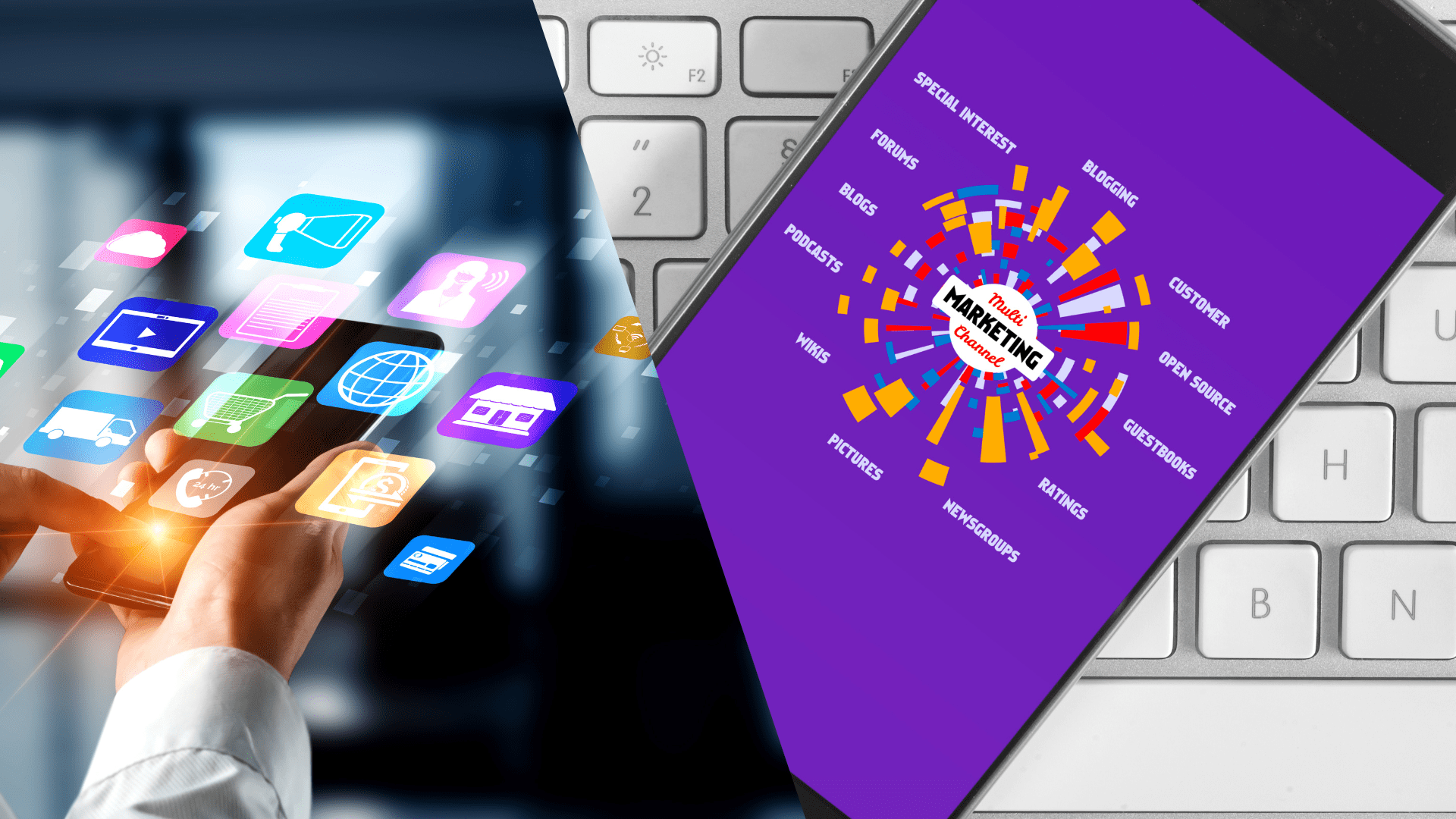
Understanding the Basics
Let’s start by getting familiar with this concept of ‘channels’ in the marketing world; a tad similar to television channels, but rather than changing the channel to avoid adverts, in marketing, channels are the adverts, the billboards, and then some more.
Now let’s dig deeper into the terminology that makes up the foundation of any forward-thinking marketing strategy.
What is a Channel in Marketing?
In the most fundamental sense, to define a channel in a marketing context is to identify the medium through which a company communicates with its customer base.
Simply defined, a channel is anywhere customers or potential customers come into contact with your product or brand, and it can be categorised under marketing or customer contact mediums.
A marketing channel could be anything ranging from traditional media like television and print, to digital entities such as the brand’s website, its physical retail stores, a billboard, or even the product’s packaging.
A customer contact channel includes the platforms through which customers reach out to the brand. Think social media channels, call centres, in-app messaging, and live chat functionalities.
Multichannel Approach: Separate and Independent
A multichannel approach is when a company uses multiple channels to spread a message about its brand. The channels operate independently and don’t relate or communicate with one another.
Essentially, a multichannel approach revolves around listing and selling your products on several of your brand’s multiple channels. The main focus of the strategy is on the product itself and making it available on more than one channel, to ensure that customers can access it from their preferred platform.
This multichannel retail strategy is essentially all about reaching out and being where your customer is.
Defining Omnichannel: Integrated and Seamless
An omnichannel strategy approach is about how the different channels of your business interact with one another, for the purpose of creating a seamless and consistent customer experience.
An omnichannel marketing strategy puts the focus squarely on the customer. By linking and integrating different channels, this strategy can give customers a consistent experience across all platforms, making their shopping experience as easy and enjoyable as possible, no matter how or where customers choose to interact with the brand.
Simply, picture a network where every time a customer checks a product or service your brand offers, it’s seamlessly linked to their next touchpoint. This means they can go from looking at products online to buying them in-store without any hiccups or having to restart their journey.
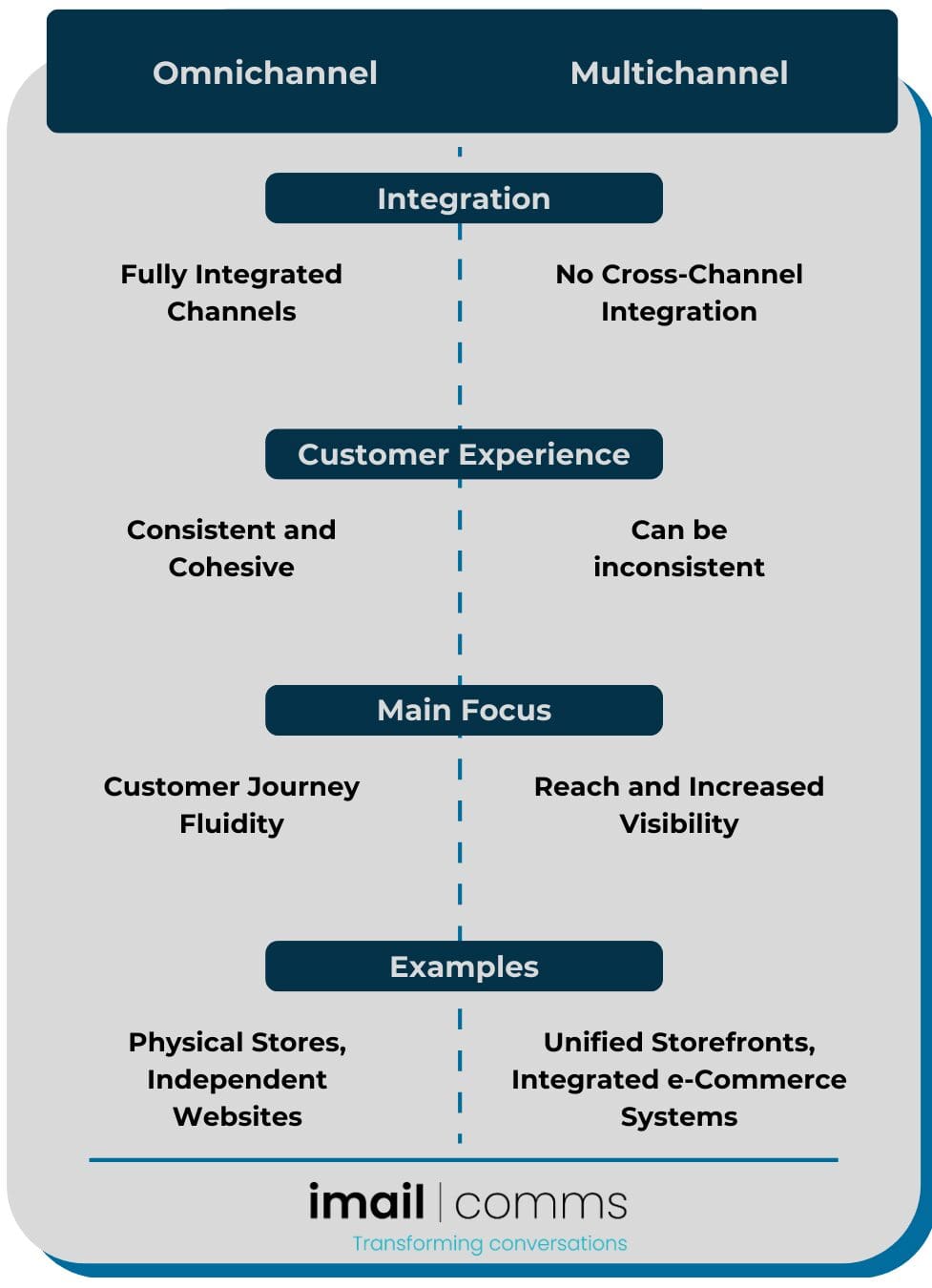
The intrinsic merits of each approach define their applicability. While multichannel retail is oriented toward consumer attraction, an omnichannel marketing platform is integratingly focused on the ultimate customer experience.
Multichannel Marketing Essentials
Tapping into multiple channels isn’t just about your brand’s presence or increasing the number of your marketing channels; it’s about crafting a multichannel growth strategy that resonates with your target audience through finely tuned, channel-centric approaches.
Maximising Visibility Across Platforms
Think about running a boutique skincare line. The whole idea? Get your products in front of customers wherever they’re searching for their next skincare obsession.
Whether they’re getting hands-on in physical stores, browsing through your beautifully curated website, or unexpectedly finding your brand on Amazon, you want to make sure your skincare line is there, waiting for them.
It’s pretty straightforward: the more places people can find your skincare products, the more opportunities you have to make sales.
Adding Amazon into the mix is like hitting the visibility jackpot. Suddenly, you’re in front of an even larger crowd who might not have known your brand name or had the chance to visit your physical location or website.
They’re on Amazon, looking for skincare solutions, and there you are. It’s about leveraging Amazon’s huge customer base and the ease of shopping it offers, presenting a golden opportunity to introduce your skincare line to a whole new group of potential customers.
Pros and Cons
Multichannel marketing strategies offer the flexibility to reach customers and encourage their engagement through their preferred touchpoints.
However, employing multiple channels can sometimes lead to fragmented customer experiences, and performance tracking across these channels can also be complex.
Nonetheless, if executed with precision and wit, a multichannel marketing strategy can expand your reach and boost your brand visibility, in ways that cannot go unnoticed.
Advantages:
- Extensive reach across various platforms
- Flexibility to target distinct customer segments
- Opportunity to optimise and personalise per channel effectiveness
Challenges:
- Risk of inconsistent brand messaging
- Complexity in tracking performance metrics
- The necessity for strong cross-channel coordination
The Basics of Omnichannel Marketing
Strategies of omnichannel marketing work on ensuring that customers are recognised across all touchpoints with your brand, blending online and offline experiences seamlessly.
Mapping The Customer Journey
Imagine a shopper spots your skincare product in an Instagram ad and decides to check it out on your website. They’re interested but not quite ready to buy, so they leave it in their cart.
Thanks to your omnichannel strategy, they later receive a gentle nudge via email or a mobile app reminder, complete with a tempting discount.
Curious but wanting to see the product firsthand, they visit your physical store. Upon arrival, they find the staff is already informed about their online interest, thanks to the omnichannel approach.
The salesperson can immediately guide them to the skincare product they’ve been eyeing online and apply the discount directly, no questions asked.
This kind of personalised customer-focused journey from online interest to in-store purchase is what makes omnichannel marketing a game-changer, offering a smooth, enjoyable shopping experience that genuinely makes your customers feel understood and valued.
Advantages of Adopting an Omnichannel Approach
Going all-in on an omnichannel marketing strategy comes with a bunch of perks. It’s like setting up the perfect environment for customer loyalty to bloom and watching your sales grow as a result.
Plus, omnichannel marketing throws in the bonus of deep data insights. This means you get a more comprehensive picture of what your customers really want, allowing you to tweak their shopping experience to keep them coming back for more.
It’s all about staying in tune with what your customers desire and making sure your brand keeps up with their changing preferences.
Is Omnichannel for Everyone?
If you’re stepping into omnichannel marketing vs multi channel marketing? Brace yourself; it’s a hefty lift. You’ll need to consider serious investments in tech to make sure your customer experience is smooth across the board.
Also, you might have to reorganise how your teams work together. Think marketing chatting with sales and to everyone in between, all with marketing efforts focused on keeping the customer journey personal.
Then there’s the data puzzle – collecting it, making sense of it, and using it right, all while keeping those privacy rules in check. Going omnichannel is a big decision. It’s not just about being trendy; it’s about whether your brand has the muscle and the mindset to make it work

Omnichannel vs Multichannel Marketing
Understanding the key differences between omnichannel vs. multichannel marketing strategies is very important for developing your brand’s outreach.
Omnichannel vs Multichannel: The Core Distinction
Where multichannel focuses primarily on maximising exposure through various independent platforms, omnichannel marketing strategies are designed to create a seamless customer experience.
- Omnichannel Strategy: A concerted effort to interlink all channels for a unified customer experience.
- Multichannel Strategy: Focus on individual channel optimisation to expand reach and engagement.
Below is a summary detailing the focal points of omnichannel vs multichannel marketing:
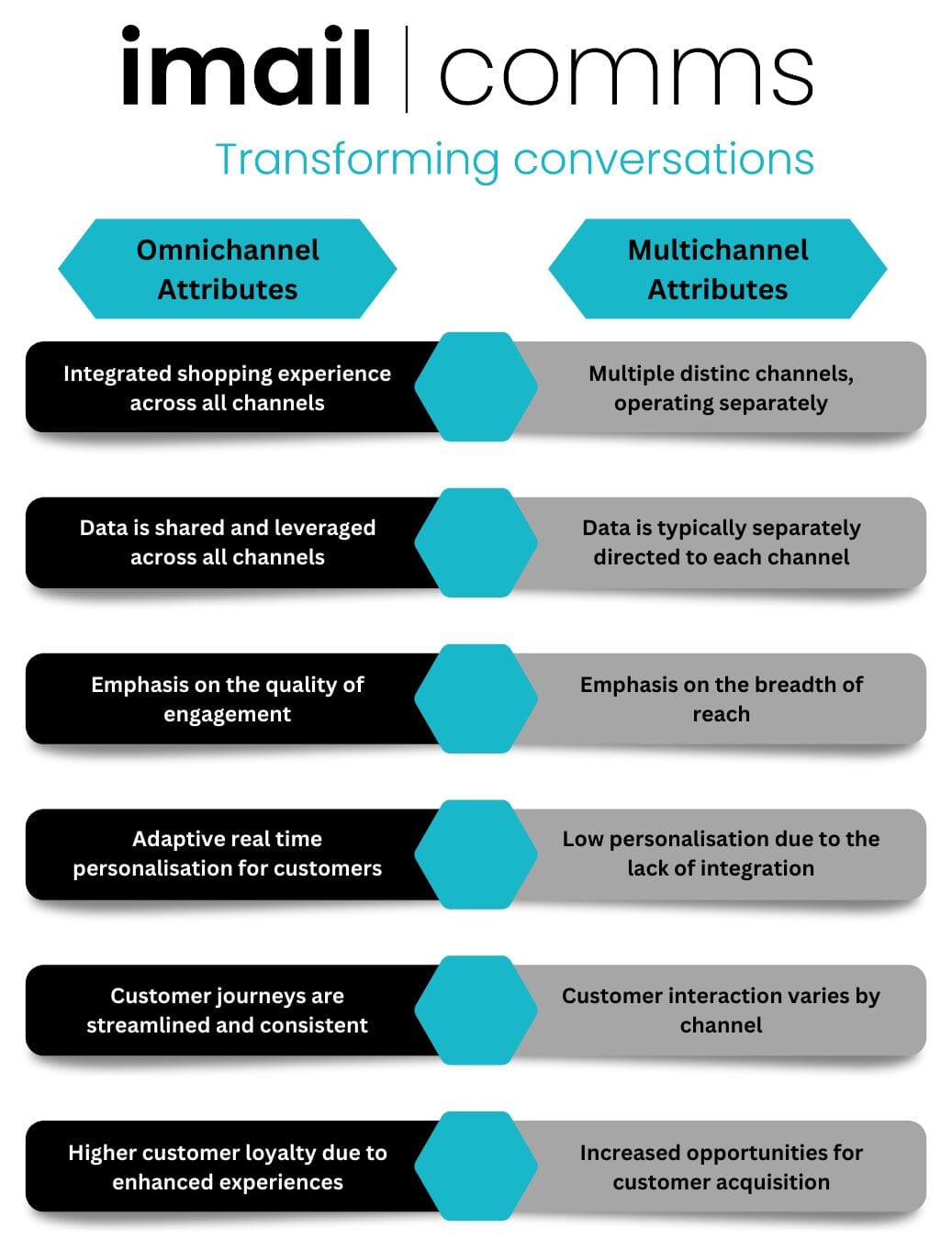
Ultimately, the choice between omnichannel and multichannel strategies depends on your brand’s priorities, resources, and what your customers expect from their multichannel retail experience, be it through a harmonious, integrated omnichannel approach or a varied, far-reaching multichannel experience.
The Customer Engagement vs Customer Experience Debate
Think of the multichannel sell approach as putting your brand everywhere, like scattering seeds in a bunch of different pots and seeing what grows.
Omnichannel, on the other hand, is all about making sure your customers have a smooth journey no matter how they connect with you.
Going with a multichannel marketing strategy might get your brand seen on more than one channel, but sometimes it misses out on making those deeper connections.
On the flip side, omnichannel marketing is a customer-centric experience that is all about stepping up the game to not just catch your customer’s attention but truly make an impact with every touchpoint.
Omnichannel marketing requires more than throwing in some personalised touches here and there; it’s about weaving them into the very fabric of your strategy, always ensuring you meet customer expectations.
Quality vs Quantity in Customer Experiences
In the quest for meaningful customer relationships, is it the volume of customer interactions or their value that weighs heavier on the scales of consumer satisfaction?
While quantity can increase visibility, it is the quality of these engagements, often determined by the depth of customer centricity, that builds brand loyalty.
Crafting an experience that resonates on a personal level is what defines a successful omnichannel strategy, offering a tapestry of customer insight-driven, personalised touchpoints that aim to raise the bar for unique and customised marketing.
Digital Transformation: Integrating Retail with E-commerce
Nowadays, omnichannel and multichannel marketing is in the midst of a significant transformation. Digital innovation is bridging the gap between traditional in-store shopping and the expansive opportunities of e-commerce.
This integration forms the backbone of the omnichannel and multichannel marketing approaches, powered by the latest in digital marketing techniques and the interconnectedness facilitated by marketing platforms.
It’s an exciting time as shopping experiences are becoming more fluid and intuitive, regardless of the individual channels where these experiences are taking place.
The Role of Technology
Let’s talk about how the shopping game is changing in the evolving worlds of omnichannel and multichannel marketing, making it easier for you to switch from browsing online to checking things out in-store without missing a beat.
The secret tool? Marketing automation software. This tech is the ultimate multi-tasked assistant for any brand, keeping the conversation going wherever you are, from sending friendly reminders about items your customers liked but didn’t purchase, to customising offers built around customer preferences and purchasing habits.
But it’s not just throwing deals and products to your customers, the software is smart about it, grouping customers by what they like, planning out winning marketing campaigns, and even breaking down the results so brands can keep elevating their standards.
Whether they’re on their phones, laptops, or walking into a store, this tech makes sure every interaction customers have with your brand feels unique and memorable, guaranteeing customer satisfaction each and every intereaction.
Case Studies: Omnichannel Success Stories
Quire a number of brands are ahead of the curve, seeing big wins from blending omnichannel marketing into their strategy. They’re using social media not just to chat but to seriously boost their online sales.
Let’s check out this epic success story that shows how it’s done:
The Rise of Gymshark
Gymshark’s meteoric rise to a $128 million empire is a tale of digital finesse and authentic engagement. Here’s the scoop, served with a dash of sophistication:
- Globally Local: They’ve cracked the code on making the global feel personal. Picture this: rockstar-like tours with fitness idols, making fans’ dreams a reality. This isn’t just marketing; it’s creating moments never forgotten.
- Influencer Genius: Before it was the norm, Gymshark wagered significantly on influencer collaborations. The wager? Sending out gear to fitness influencers, hoping for a viral result. The payoff? A colossal community of Gymshark devotees and a revenue jump to an astounding £250,000 early on (House of Marketers).
- Creative Campaigns: Take the “Blackout” campaign— a masterpiece that turned Gymshark’s digital presence dark for Black Friday, tripling their holiday revenue.
- Building a Tribe: More than a brand, Gymshark is a leader for its community, from its TikTok ventures to the ‘Gymshark Athlete Community’. Their winning tactic? Content that’s as diverse as their audience, from workout challenges to authentic influencer collaborations.
- Living the Values: In a move that’s as classy as it is commendable, Gymshark showed true colours by not furloughing a single employee during the pandemic, embodying the ethos that caring for your crew translates to genuine customer loyalty.
Gymshark’s journey is more than a success story; it’s a handbook on merging digital innovation with genuine human connection, conveying that in the world of branding, heart wins.
Choosing Your Path: Omnichannel vs. Multichannel Approach
Choosing between multichannel and omnichannel marketing isn’t just about picking a strategy; it’s about aligning with your brand’s heartbeat and how you vibe with your customers.
Omnichannel vs Multichannel: Key Considerations
Customer Journey Insight: Dive deep into how your customers like to shop and interact. Are they digital nomads roaming from screen to screen, or do they prefer a mix of online browsing and in-store visits? Understanding their habits can guide your strategy choice and potentially attract more customers.
Tech Stack and Resources: Take a hard look at your current tech setup and resources. Can your infrastructure support the seamless integration required by omnichannel, or are you better positioned to maximise separate channels in a multichannel approach?
Brand Consistency vs. Reach: Weigh the importance of delivering the same message consistently against the need to spread your brand far and wide. Omnichannel excels in creating a consistent experience, while multichannel selling can boost your visibility across different platforms.
Adaptability and Growth: Consider your brand’s growth trajectory and how adaptable you need to be. Omnichannel strategies might require more upfront investment but offer long-term engagement benefits. Multichannel can be more flexible and easier to scale in different directions.
Customer Feedback and Data: Finally, think about how you’ll gather and use customer feedback and data. Omnichannel provides a rich tapestry of interconnected data, offering insights to refine customer interactions continually. Multichannel strategies may offer broader, less connected data points.
Seek our Advice
In the world of retail and digital marketing, choosing between omnichannel vs multichannel strategies is less about crowning a champ, and more about finding the right fit for your brand’s ethos and how you dream of chatting with your customers.
On the other hand, multichannel marketing boasts about being all over the map, giving your customers plenty of ways to connect. This approach is all about spreading out far and wide, making sure your brand pops up in as many places as possible.
Whichever marketing strategy your business opts for, remember that the key to any successful strategy is to stay true to your brand’s essence and keep your customers’ needs at the heart of your strategy.
With imail comms services and our innovative customer communication platforms, your choice has never been easier. If you have any hesitations about how imail comms can be the ultimate partner for your smart marketing and customer communication needs, you can book an exclusive tour with us and discover the reasons we are industry pioneers with the largest hybrid mail operation.
Frequently Asked Questions (FAQ’s)
These are some of the most common inquiries when it comes to omnichannel vs multichannel marketing.
What’s the difference between omnichannel vs multichannel marketing?
Omnichannel marketing is like having a smooth conversation with your customers across different platforms, where everything’s connected so the chat flows nicely and feels personal, no matter where it’s happening. Multichannel marketing, on the other hand, is more about being in a bunch of places at once, trying to catch customers’ attention.
Here, each channel does its own thing, focusing more on getting the word out there than making sure the experience feels connected.
What are the benefits of omnichannel marketing?
The benefits of omnichannel marketing include consistent and personalised customer experiences, higher customer retention rates, increased sales, and the ability to gain comprehensive insights from customer data to enhance your marketing strategies.
What are the key differences in customer experience between omnichannel vs. multichannel strategies?
Omnichannel strategies focus on delivering a seamless and consistent customer-centric experience across all channels, making the transition between channels feel effortless for customers.
Multichannel strategies, while offering multiple touchpoints, may result in a more fragmented experience due to the lack of integration among these marketing channels.
Can multichannel marketing enhance customer engagement?
Yes, by using a variety of channels, multichannel marketing can increase your brand’s visibility and create more opportunities for customer to engage with you. However, it may fall short of providing a cohesive and consistent experience that actually turns your customers into loyal clients when compared to an omnichannel marketing strategy.
How does multichannel marketing work to engage customers?
Multichannel marketing works by utilising various separate channels to maximise the brand’s outreach and reach customers through diverse touchpoints. This approach helps in reaching broader audiences and is beneficial for targeting different customer segments.


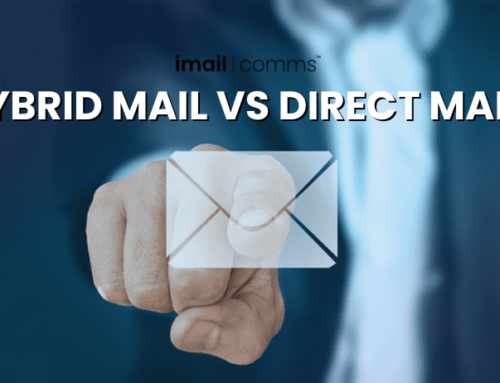
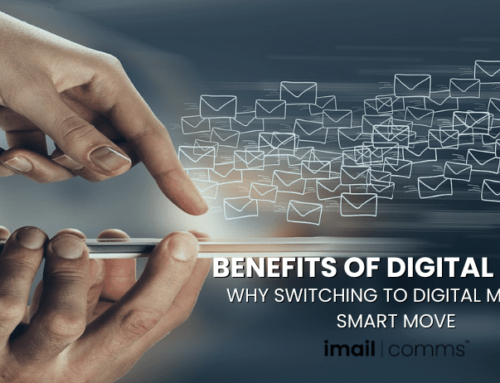
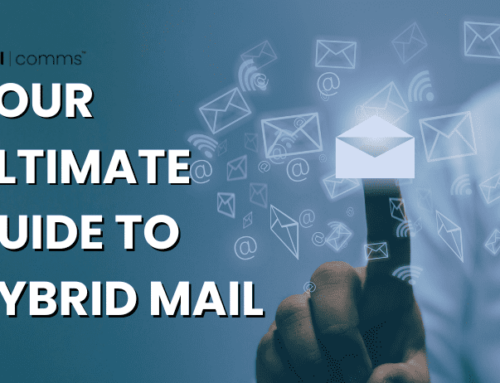
Leave A Comment
You must be logged in to post a comment.